
Star Lore Art
Sternzeichenkalender
Constellations Calendar
Attributed to Regiomontanus, 1512


 |
Star Lore ArtSternzeichenkalender
|
 |


In the category Books by Regiomontanus, Wikimedia displays a large number of
woodcuts belonging to an astronomical calendar published in 1512.
 The collection is titled Calendarius teusch Maister Joannis Küngspergers, translating to German Calendar by Master Joannis Küngsperger. Küngspergers is an antiquated spelling of the name Königsberg - Johannes Müller von Königsberg, to be precise.  Von Königsberg was a mathematician, astrologer and astronomer of the German Renaissance who lived from 1436 to 1476 and was active in Vienna, Buda and Nuremberg. His contributions were instrumental in the development of Copernican heliocentrism in the decades following his death.  Regiomontanus wrote under the Latinized name of Ioannes de Monteregio,or Regio Monte, meaining King's Mountain, which in German is Königsberg. The adjectival Regiomontanus was first used by Philipp Melanchthon in 1534.  According to Wikimedia. the Constellation Calendar was published in 1512, 36 years after Regiomontanus' death. Most likely, it used some of the astronomer's earlier writings.  |
 |
The illustrations are strikingly similar to those of an unknown artist commissioned by Erhard Ratdolt for his 1482 issue of
Hyginus’s Poeticon Astronomicon. Like in the earlier publication,
the artist used a lot of creative freedom regarding the true positions of the stars. In addition, some of the images in the calendar are mirror images
of the previous illustrations in Poeticon Astronomicon
 The Wikimedia site also includes two other sets of illustrations attributed to the writings of Regiomontanus and (according to Wikimedia) also published in 1512. All of them seem to have been done by the same, unknown artist.  One set shows illustrations of the five known planets, the sun and the moon; the other set is a so called farmer's calendar (Bauernkalender in German), showing the signs of the Zodiac and the farm-work associated with that particular part of the year.  Although the illustrations are astronomically largely inaccurate and the provenance is sketchy, they are still a great visualization of the astronomical understanding of people during the early Renaissance era.  Wikimedia credits the art collection Deutsche Fotothek with the original images. Click on the pictures for larger images. |
 Regiomontanus; Wikipedia
Regiomontanus; Wikipedia |


The Constellations |
 Andromeda
Andromeda |
 Aquarius
Aquarius |
 Aquila (Vultur Volans)
Aquila (Vultur Volans) |
 Ara
Ara |

 Argo Navis
Argo Navis |
 Aries
Aries |
 Auriga
Auriga |
 Boötes
Boötes
|

 Cancer
Cancer |
 Canis Major
Canis Major |
 Canis Minor
Canis Minor |
 Capricornus
Capricornus |

 Cassiopeia
Cassiopeia |
 Centaurus
Centaurus |
 Cepheus
Cepheus |
 Cetus
Cetus
|

 Corona Borealis
Corona Borealis |
 Cygnus
Cygnus |
 Delphinus
Delphinus |
 Draco, Ursa Maj., Ursa Min.
Draco, Ursa Maj., Ursa Min.
|

 Equuleus
Equuleus |
 Eridanus
Eridanus |
 Gemini
Gemini |
 Hercules
Hercules
|

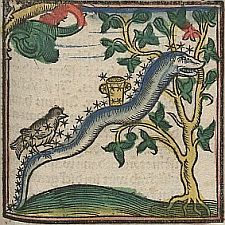 Hydra, Crater, Corvus
Hydra, Crater, Corvus |
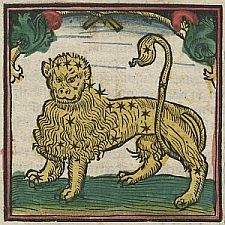 Leo
Leo |
 Lepus
Lepus |
 Libra
Libra
|

 Lyra
Lyra |
 Lyra (as Vultur Cadens)
Lyra (as Vultur Cadens) |
 Milky Way
Milky Way |
 Ophiuchus (Serpentarius)
Ophiuchus (Serpentarius)
|

 Orion
Orion |
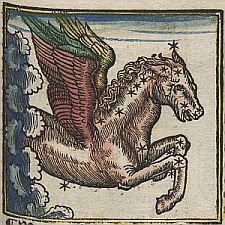 Pegasus
Pegasus |
 Perseus
Perseus |
 Pisces
Pisces
|

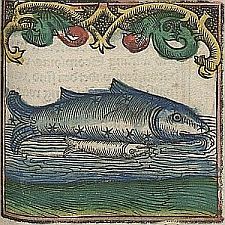 Pisces Australis
Pisces Australis |
 Sagittarius
Sagittarius |
 Scorpius
Scorpius |
 Taurus
Taurus
|

 Triangle
Triangle |
 Virgo
Virgo |


Other Objects |
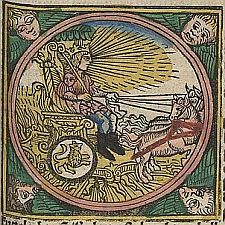 The Sun
The Sun |
 The Moon
The Moon |
 Mercury
Mercury |
 Venus
Venus |

 Mars
Mars |
 Jupiter
Jupiter |
 Saturn
Saturn |
 The Comet of 1472 |


Farming Calendar |
The Farming Calendar section consisted of several pages describing the constellations of the Zodiac and several pages describing the farm work performed
during those particular times.
 Below are teo examples of Zodiac descriptions and two examples of farm tasks. |

 |

|
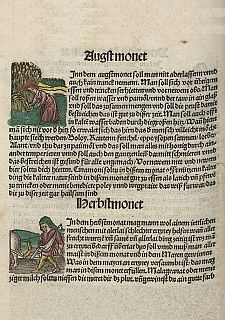
|
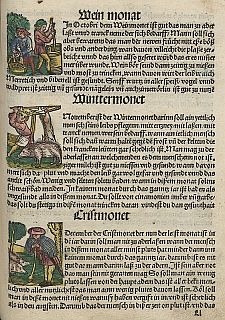
|

| More examples are provided by Wikimedia. |


|
Back to Star Lore |
Back to Art |
Back to Space Page |
Back to English |
 Back to Start Page |